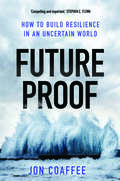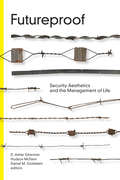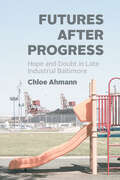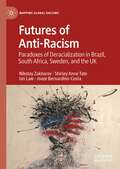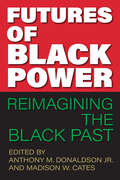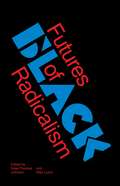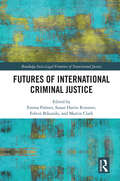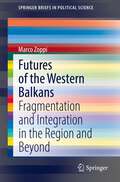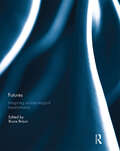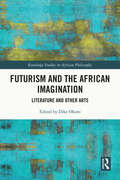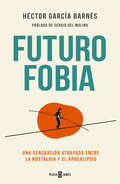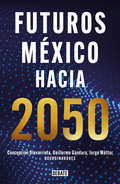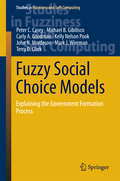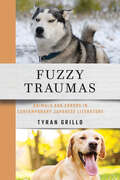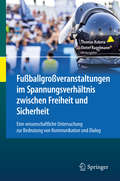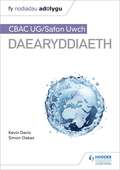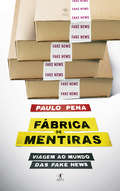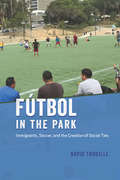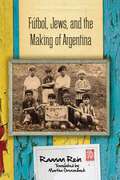- Table View
- List View
Futureproof: How to Build Resilience in an Uncertain World
by Jon CoaffeeA compelling and definitive account of why we need to radically rethink our approach to dealing with catastrophic events Catastrophic events such as 9/11, Hurricane Katrina, and the Tohoku "Triple Disaster" of earthquake, tsunami, and nuclear meltdown that hit the eastern seaboard of Japan in 2012 are seen as surprises that have a low probability of occurring but have a debilitating impact when they do. In this eye-opening journey through modern and ancient risk management practices, Jon Coaffee explains why we need to find a new way to navigate the deeply uncertain world that we live in. Examining how governments have responded to terrorist threats, climate change, and natural hazards, Coaffee shows how and why these measures have proven inadequate and what should be done to make us more resilient. While conventional approaches have focused on planning and preparing for disruptions and enhanced our ability to "bounce back," our focus should be on anticipating future challenges and enhancing our capacity to adapt to new threats.
Futureproof: Security Aesthetics and the Management of Life (Global Insecurities)
by Daniel M. Goldstein D. Asher Ghertner Hudson McFannSecurity is a defining characteristic of our age and the driving force behind the management of collective political, economic, and social life. Directed at safeguarding society against future peril, security is often thought of as the hard infrastructures and invisible technologies assumed to deliver it: walls, turnstiles, CCTV cameras, digital encryption, and the like. The contributors to Futureproof redirect this focus, showing how security is a sensory domain shaped by affect and image as much as rules and rationalities. They examine security as it is lived and felt in domains as varied as real estate listings, active-shooter drills, border crossings, landslide maps, gang graffiti, and museum exhibits to theorize how security regimes are expressed through aesthetic forms. Taking a global perspective with studies ranging from Jamaica to Jakarta and Colombia to the U.S.-Mexico border, Futureproof expands our understanding of the security practices, infrastructures, and technologies that pervade everyday life. Contributors. Victoria Bernal, Jon Carter, Alexandra Demshock, Zaire Z. Dinzey-Flores, Didier Fassin, D. Asher Ghertner, Daniel M. Goldstein, Rachel Hall, Rivke Jaffe, Ieva Jusionyte, Catherine Lutz, Alejandra Leal Martínez, Hudson McFann, Limor Samimian-Darash, AbdouMaliq Simone, Austin Zeiderman
Futures after Progress: Hope and Doubt in Late Industrial Baltimore
by Chloe AhmannA powerful ethnographic study of South Baltimore, a place haunted by toxic pasts in its pursuit of better futures. Factory fires, chemical explosions, and aerial pollutants have inexorably shaped South Baltimore into one of the most polluted places in the country. In Futures after Progress, anthropologist Chloe Ahmann explores the rise and fall of industrial lifeways on this edge of the city and the uncertainties that linger in their wake. Writing from the community of Curtis Bay, where two hundred years of technocratic hubris have carried lethal costs, Ahmann also follows local efforts to realize a good future after industry and the rifts competing visions opened between neighbors. Examining tensions between White and Black residents, environmental activists and industrial enthusiasts, local elders and younger generations, Ahmann shows how this community has become a battleground for competing political futures whose stakes reverberate beyond its six square miles in a present after progress has lost steam. And yet—as one young resident explains—“that’s not how the story ends.” Rigorous and moving, Futures after Progress probes the deep roots of our ecological predicament, offering insight into what lies ahead for a country beset by dreams deferred and a planet on the precipice of change.
Futures and Fictions
by Simon O'Sullivan Henriette Gunkell Ayesha HameedFutures and Fictions is a book of essays and conversations that explore possibilities for a different ‘political imaginary’ or, more simply, the imagining and imaging of alternate narratives and image-worlds that might be pitched against the impasses of our neoliberal present. In particular, the book contributes to prescient discussions around decolonization, post-capitalism and new kinds of social movements – exploring the intersections of these with contemporary art practice and visual culture. Contributions range from work on science, sonic and financial fictions and alternative space-time plots to myths and images generated by marginalized and ‘minor’ communities, queer-feminist strategies of fictioning, and the production of new Afro- and other futurisms.
Futures of Anti-Racism: Paradoxes of Deracialization in Brazil, South Africa, Sweden, and the UK (Mapping Global Racisms)
by Nikolay Zakharov Ian Law Shirley Anne Tate Joaze Bernardino-CostaThis book assesses the nature and extent of the project of deracialisation required to counter the contemporary dynamics of racialisation across four varieties of modernity: Sweden, South Africa, Brazil and the UK, based on original research on each of the four country contexts. Since racism began to be recognised or identified as a problem, an assemblage of supra-national initiatives have been devised in the name of combatting, dismantling or reducing it. There has been a recent shift whereby such supra-national bodies move toward embedding strategies against racism within the framework of human rights and devolving such responsibility to other bodies at a national level.The authors bring together a team of international experts in this field, in order to compare the priorities and effectiveness of current strategic approaches in each national context, examining their relationalities and connecting these cases within a joint theoretical and methodological framework. Thus, this book contributes to theoretical knowledge on racialisation and deracialisation, produce a new data set on contemporary interventions and institutions and establish new principles and practice for national projects of deracialisation and anti-racism, building on cross-national learning.
Futures of Black Power: Reimagining the Black Past (Frontiers of the American South)
by Anthony M. Donaldson Jr. Madison W. CatesIllustrating new frameworks for recognizing and studying Black Power and Black radicalism Rewriting narratives that present Black Power as related but marginal to the Civil Rights Movement, this book uncovers and centers unexpected sites of Black Power activism within the Black freedom struggle. In this collection, leading scholars look at how we study the past and suggest new ways historians can recognize Black Power and Black radicalism in the future. In Futures of Black Power, Ashley Farmer offers a framework for developing Black Power archives, Jasmin Young makes the case for oral history collections dedicated to the study of the movement, and D’Weston Haywood discusses Afrofuturist underpinnings in the Nation of Islam. Interspersed with their essays are oral history interviews with activists Kathleen Cleaver, Gwendolyn Zoharah Simmons, Mabel Williams, and Nikki Giovanni. These essays and primary sources show how today’s scholars of Black Power are incorporating memory studies, gender studies, and intellectual histories, and they point the way forward to new avenues for research and public engagement. They collectively illustrate the need to preserve and remember the variety of voices, actions, and imaginings that constitute Black Power, elements of Black history that are often ignored or forgotten. A volume in the series Frontiers of the American South, edited by William A. Link Publication of this work made possible by a Sustaining the Humanities through the American Rescue Plan grant from the National Endowment for the Humanities.
Futures of Black Radicalism
by Gaye Theresa Johnson Alex LubinWith racial justice struggles on the rise, a probing collection considers the past and future of Black radicalismBlack rebellion has returned. Dramatic protests have risen up in scores of cities and campuses; there is renewed engagement with the history of Black radical movements and thought. Here, key intellectuals—inspired by the new movements and by the seminal work of the scholar Cedric J. Robinson—recall the powerful tradition of Black radicalism while defining new directions for the activists and thinkers it inspires. In a time when activists in Ferguson, Palestine, Baltimore, and Hong Kong immediately connect across vast distances, this book makes clear that new Black radical politics is thoroughly internationalist and redraws the links between Black resistance and anti-capitalism. Featuring the key voices in this new intellectual wave, this collection outlines one of the most vibrant areas of thought today. With contributions from Greg Burris, Jordan T. Camp, Angela Davis, Ruth Wilson Gilmore, Avery F. Gordon, Stefano Harney, Christina Heatherton, Robin D.G. Kelley, George Lipsitz, Fred Moten, Paul Ortiz, Steven Osuna, Kwame M. Phillips, Shana L. Redmond, Cedric J. Robinson, Elizabeth P. Robinson, Nikhil Pal Singh, Damien M. Sojoyner, Darryl C. Thomas, and Françoise Vergès.
Futures of Digital Scholarly Editing
by Kenneth M. PriceExploring technology, ethics, and culture to unlock digital scholarship&’s futureFutures of Digital Scholarly Editing navigates the ever-shifting terrain of digital academia, examining practical and ethical considerations as technology continues to evolve. In this indispensable collection, digital humanities practitioners and scholars work with a wide range of archival materials to confront key challenges surrounding the adaptation and sustainability of digital editorial projects as well as their societal impact. Broaching essential questions at the nexus of technology and culture, Futures of Digital Scholarly Editing is organized around three principal frameworks: access, sustainability, and interoperability; ethics and community involvement; and the evolution of textual scholarship. From addressing outdated technical infrastructures to fostering new collaborations, this volume serves as a beacon guiding scholars and institutions through the complexities of digital editing in an era of profound technological and societal transformation. Contributors: Stephanie P. Browner, The New School; Julia Flanders, Northeastern U; Ed Folsom, U of Iowa; Nicole Gray, U of Nebraska–Lincoln; Cassidy Holahan, U of Nevada, Las Vegas; Fotis Jannidis, U of Würzburg; Aylin Malcolm, U of Guelph; Sarah Lynn Patterson, U of Massachusetts Amherst; Elena Pierazzo, U of Tours; K.J. Rawson, Northeastern U; Whitney Trettien, U of Pennsylvania; John Unsworth, U of Virginia; Dirk Van Hulle, U of Oxford; Robert Warrior, U of Kansas; Marta L. Werner, Loyola U Chicago. Retail e-book files for this title are screen-reader friendly with images accompanied by short alt text and/or extended descriptions.
Futures of International Criminal Justice (Routledge Socio-Legal Frontiers of Transitional Justice)
by Martin Clark Emma Palmer Edwin Bikundo Susan Harris RimmerThis collection identifies and discusses problems and opportunities for the theory and practice of international criminal justice. The International Criminal Court and project of prosecuting international atrocity crimes have faced multiple challenges and critiques. In recent times, these have included changes in technology, the conduct of armed conflict, the environment, and geopolitics. The mostly emerging contributors to this collection draw on diverse socio-legal research frameworks to discuss proposals for the futures of international criminal justice. These include addressing accountability gaps and under-examined or emerging areas of criminality at, but also beyond, the International Criminal Court, especially related to technology and the environment. The book discusses the tensions between universalism and localisation, as well as the regionalisation of international criminal justice and how these approaches might adapt to dynamic organisational, political and social structures, at the ICC and beyond. The book will be of interest to students, researchers and academics. It will also be a useful resource for civil society representatives including justice advocates, diplomats and other government officials and policy-makers.
Futures of the Western Balkans: Fragmentation and Integration in the Region and Beyond (SpringerBriefs in Political Science)
by Marco ZoppiThis Brief provides a survey of key political, social, and economic issues affecting the Western Balkans region. Taking a two-pronged conceptual approach focusing on fragmentation and integration, the volume highlights commonalities and differences in a number of simultaneous dynamics currently characterizing the region: Europeanization and EU access, market integration, and migration and socio-demographic transformations. Stressing the interconnectedness of these issues, the volume synthesizes key questions for the future of the region, such as the relationship between socio-demographic trends and economic development, the effects of depopulation on further EU integration, and the economic and political repercussions of enhanced intra-regional trade. Explicitly interdisciplinary, this Brief will be useful for researchers and students specializing in the Balkans and Western Balkans, post-socialist countries, European affairs, enlargement, foreign policy, international relations, regional studies, economics, economic transition, and socio-demographics.
Futures: Imagining Socioecological Transformation
by Bruce BraunFutures: Imagining Socioecological Transformation brings together leading scholars to explore how we might know, enact, and struggle for, the conjoined social and ecological transformations we need to achieve just and sustainable futures. The question of transformation, and how it might be achieved, is explored across a variety of topics and geographical sites, and through heterodox analytical and theoretical approaches, in a collective effort to move beyond a form of critique that hands down judgements, to one that brings new ideas and new possibilities to life. Chapters are lively and original engagements with concrete situations that sparkle with creativity. Together, they add up to an impressive study of how to live, and what to struggle for, in the complex socioecological landscapes of the Anthropocene. This book was previously published as a special issue of the Annals of the Association of American Geographers.
Futurism and the African Imagination: Literature and Other Arts (Routledge Studies in African Philosophy)
by Dike OkoroThis book investigates how African authors and artists have explored themes of the future and technology within their works. Afrofuturism was coined in the 1990s as a means of exploring the intersection of African diaspora culture with technology, science and science fiction. However, this book argues that literature and other arts within Africa have always reflected on themes of futurism, across diverse forms of speculative writing (including science fiction), images, spirituality, myth, magical realism, the supernatural, performance and other forms of oral resources. This book reflects on themes of African futurism across a range of literary and artistic works, also investigating how problems such as racism, sexism, social injustice and postcolonialism are reflected in these narratives. Chapters cover authors, artists, movements and performers such Wole Soyinka, Ben Okri, Ngugi wa Thiong’o, Elechi Amadi, Mazisi Kunene, Nnedi Okorafor, Lauren Beukes, Leslie Nneka Arimah and the New African Movement. The book also includes a range of original interviews with prominent authors and artists, including Tanure Ojaide, Lauren Beukes, Patricia Jabbeh Wesley, Benjamin Kwakye, Ntongela Masilela and Bruce Onobrakpeya. Interdisciplinary in its approach, this book will be an important resource for researchers across the fields of African literature, philosophy, culture and politics.
Futurofobia: Una generación atrapada entre la nostalgia y el apocalipsis
by Héctor García BarnésEl libro de una generación que ha dejado de creer en el futuro. Futurofobia es, literalmente, «miedo al futuro». Futurofobia es esa sensación que nos hace imaginar que todo lo que está por venir va a ser peor que lo que ya tenemos. Futurofobia es pensar que nada de lo que puedas hacer cambiará las cosas. ¿Para qué pelear si todas las luchas están condenadas al fracaso? Futurofobia es no tener ilusiones. Futurofobia es estar agotado. Futurofobia es creer en las distopías y desconfiar de las utopías. Futurofobia es cinismo. Futurofobia es individualismo. Futurofobia es sustituir el deseo por el miedo. Futurofobia es pensar que todo tiempo pasado fue mejor. Futurofobia es una profecía autocumplida. Si asumimos que el ser humano es estúpido por naturaleza, si consideramos que lo que se avecina es el apocalipsis, si dejamos de creer en la política, en el arte y en el amor, nos convertiremos en unos cínicos. Tenemos los futuros que soñamos: si nuestro único horizonte es el fin del mundo, ese será nuestro presente. La futurofobia no es lo importante, sino que esta nos ayude a pensar sobre nosotros mismos. Futurofobia es solo una palabra. Los nacidos a partir de los ochenta crecimos en una burbuja de optimismo que un día estalló. Desde entonces, hemos vivido con la palabra crisis cosida a nuestros destinos y hemos visto cómo todas las ideas que teníamos sobre el futuro se han esfumado. La futurofobia es nuestra reacción a la sensación decepcionante de que a la vuelta de la esquina acecha el invierno, como en la letanía de Juego de Tronos. Caminamos en precario equilibrio por un alambre que conecta dos formas extremas de enfrentarse a esta vida incierta: la de refugiarnos en la nostalgia de una época en la que veíamos películas en VHS o la de abrazar el apocalipsis mientras compartimos memes. Nostálgicos y apocalípticos nos hemos dado por vencidos consiguiendo que el pesimismo se convierta en la principal seña de esta generación. Este libro es, al mismo tiempo, un análisis de cómo hemos llegado hasta aquí y una invitación a cambiar el rumbo, porque el futuro sí está en nuestras manos y podemos reescribir nuestra historia. «El miedo al futuro es el punto de partida, no el de llegada, y eso es una virtud rarísima en un mundo de ensayistas dogmáticos y de encantadores de serpientes. García Barnés está acostumbrado a mirar las cosas mucho y bien, y encuentra indicios y revelaciones donde otros solo ven escombros o ruido». Sergio del Molino La crítica ha dicho:«El miedo al futuro es el punto de partida, no el de llegada, y eso es una virtud rarísima en un mundo de ensayistas dogmáticos y de encantadores de serpientes. García Barnés está acostumbrado a mirar las cosas mucho y bien, y encuentra indicios y revelaciones donde otros solo ven escombros o ruido».Sergio del Molino
Futuros México hacia 2050
by Guillermo Gándara«Los 15 retos globales proporcionan un marco de referencia para comprender y explorar el cambio global. En Futuros México hacia 2050 se realiza este proceso. ¡Felicidades! ¡Un trabajo monumental!» Jerome C. Glenn Presidente y cofundador del Millennium Project «Los 15 retos globales proporcionan un marco de referencia para comprender y explorar el cambio global. En Futuros México hacia 2050 se realiza este proceso. ¡Felicidades! ¡Un trabajo monumental!» Jerome C. Glenn Presidente y cofundador del Millennium Project «Futuros México hacia 2050 nos invita a llevar nuestra mirada hacia el futuro de una manera informada, responsable y consciente. Una lectura imperdible cuyas reflexiones nos confirman que, como señala Alan Kay, ‘la manera de predecir el futuro es inventándolo uno mismo’.» David Garza Salazar Rector del Tecnológico de Monterrey «Con una mirada lúcida y diversa, este magnífico libro es un tesoro de visiones y reflexiones de los retos que México (e Iberoamérica) han de transitar en los próximos 30 años. Su lectura, altamente recomendada, es una cura para evitar la miopía.» Rebeca Grynspan Secretaria general iberoamericana «Enriquecer las fuentes de inspiración para imaginar el futuro es uno de los retos centrales de nuestro tiempo. Futuros México hacia 2050 ofrece un rico catálogo de imágenes del futuro. ¡Estimula tu imaginación, lee este libro!» Riel Miller Jefe de Alfabetización en Futuros en la UNESCO «En momentos de tránsito hacia una nueva dimensión de la humanidad, Futuros México hacia 2050 se convierte en una herramienta necesaria e indispensable para construir un futuro deseable y consistente. Es un medio para lograr equilibrio y felicidad en las personas que lo lean.» Julio MillánPresidente de la World Future Society. Capítulo México «Futuros México hacia 2050 es una obra ambiciosa, fincada en las potencialidades naturales y humanas de nuestro país, con la mirada puesta en el porvenir, realizada con profesionalismo, profundo conocimiento y claridad envidiable, que nos impulsará en la construcción de un país más próspero, más justo, más amable.» Antonio Muñoz Santiago Presidente de la Fundación Biósfera de Álica, A.C.
Fuzzy Social Choice Models
by Peter C. Casey Michael B. Gibilisco Carly A. Goodman Kelly Nelson Pook John N. Mordeson Mark J. Wierman Terry D. ClarkThis book explores the extent to which fuzzy set logic can overcome some of the shortcomings of public choice theory, particularly its inability to provide adequate predictive power in empirical studies. Especially in the case of social preferences, public choice theory has failed to produce the set of alternatives from which collective choices are made. The book presents empirical findings achieved by the authors in their efforts to predict the outcome of government formation processes in European parliamentary and semi-presidential systems Using data from the Comparative Manifesto Project (CMP), the authors propose a new approach that reinterprets error in the coding of CMP data as ambiguity in the actual political positions of parties on the policy dimensions being coded. The range of this error establishes parties' fuzzy preferences. The set of possible outcomes in the process of government formation is then calculated on the basis of both the fuzzy Pareto set and the fuzzy maximal set, and the predictions are compared with those made by two conventional approaches as well as with the government that was actually formed. The comparison shows that, in most cases, the fuzzy approaches outperform their conventional counterparts.
Fuzzy Traumas: Animals and Errors in Contemporary Japanese Literature
by Tyran GrilloIn Fuzzy Traumas, Tyran Grillo critically examines the portrayal of companion animals in Japanese literature in the wake of the 1990s "pet boom." Blurring the binary between human and nonhuman, Grillo draws on Japanese science fiction, horror, guide-dog stories, and a notorious essay on euthanasia, treating each work as a case study of human-animal relationships gone somehow awry. He makes an unprecedented case for Japan's pet boom and how the country's sudden interest in companion animals points to watershed examples of "productive errors" that provide necessary catalysts for change.Examining symbiotic concepts of "humanity" and "animality," Grillo challenges negative views of anthropomorphism as something unethical, redefining it as a necessary rupture in, not a bandage on, the thick skin of the human ego. Fuzzy Traumas concludes by introducing the paradigm shift of "postanimalism" as a detour from the current traffic jam of animal-centered philosophies, arguing that humanity cannot move past anthropocentricism until we reflect honestly on what it means for the human condition.
Fußballgroßveranstaltungen im Spannungsverhältnis zwischen Freiheit und Sicherheit: Eine wissenschaftliche Untersuchung zur Bedeutung von Kommunikation und Dialog
by Dieter Kugelmann Thomas KuberaDas Buch präsentiert die wissenschaftlichen Ergebnisse des interdisziplinären Forschungsprojektes „Mehr Sicherheit im Fußball – Verbessern der Kommunikationsstrukturen und Optimieren des Fandialogs“. Die aus dem vom Bundesministerium für Bildung und Forschung geförderten Projekt hervorgehenden Erkenntnisse zum Status Quo der Sicherheitsgewährleistung bei Fußballgroßveranstaltungen bieten eine Reihe von Ansätzen zur Verbesserung von Kommunikationsstrukturen und -prozessen. Sie basieren auf Untersuchungen an 25 Vereinsstandorten der ersten drei Profiligen. Das Feld wurde durch Interviews mit Experten aus Fanarbeit, Fanszenen, Polizeibehörden, Vereinen und Kommunen und durch Befragungen von Stadionbesuchern, Fangruppierungen, Reisenden im Fanreiseverkehr und der Bevölkerung erschlossen. Weiterhin wurden rechtliche Stellungnahmen und Empfehlungen erarbeitet sowie eine technische Kommunikationsplattform beforscht, die eine effektive Zusammenarbeit der verschiedenen Akteure ermöglichen soll.
Fy Nodiadau Adolygu: CBAC UG/Safon Uwch Daearyddiaeth My Revision Notes: WJEC/Eduqas AS/A-level Geography Welsh-language edition)
by Kevin DavisTarget success in WJEC and WJEC Eduqas AS/A-level Geography with this proven formula for effective, structured revision.Key content coverage is combined with exam-style tasks and practical tips to create a revision guide that students can rely on to review, strengthen and test their knowledge.With My Revision Notes every student can:- Plan and manage a successful revision programme using the topic-by-topic planner- Consolidate subject knowledge by working through clear and focused content coverage- Test understanding and identify areas for improvement with regular 'Now Test Yourself' tasks and answers- Enhance exam responses using relevant examples and case studies for each topic- Improve exam technique through practice questions, expert tips and examples of typical mistakes to avoidThis revision guide covers the following topics:- Changing landscapes (Coastal landscapes; Glaciated landscapes)- Changing places- Global systems (Water and carbon cycles)- Global governance (Processes and patterns of global migration; Global governance of the Earth's oceans)- Contemporary themes in geography (Tectonic hazards)It also includes exam questions for 21st century challenges.This revision guide is suitable for the following specifications:- 2016 WJEC AS/A-level Geography specification regulated by Qualifications Wales- 2016 WJEC Eduqas AS/A-level Geography specification regulated by OfqualPlease note this is a Welsh language edition.
Fy Nodiadau Adolygu: CBAC UG/Safon Uwch Daearyddiaeth My Revision Notes: WJEC/Eduqas AS/A-level Geography Welsh-language edition) (MRN)
by Kevin DavisTarget success in WJEC and WJEC Eduqas AS/A-level Geography with this proven formula for effective, structured revision.Key content coverage is combined with exam-style tasks and practical tips to create a revision guide that students can rely on to review, strengthen and test their knowledge.With My Revision Notes every student can:- Plan and manage a successful revision programme using the topic-by-topic planner- Consolidate subject knowledge by working through clear and focused content coverage- Test understanding and identify areas for improvement with regular 'Now Test Yourself' tasks and answers- Enhance exam responses using relevant examples and case studies for each topic- Improve exam technique through practice questions, expert tips and examples of typical mistakes to avoidThis revision guide covers the following topics:- Changing landscapes (Coastal landscapes; Glaciated landscapes)- Changing places- Global systems (Water and carbon cycles)- Global governance (Processes and patterns of global migration; Global governance of the Earth's oceans)- Contemporary themes in geography (Tectonic hazards)It also includes exam questions for 21st century challenges.This revision guide is suitable for the following specifications:- 2016 WJEC AS/A-level Geography specification regulated by Qualifications Wales- 2016 WJEC Eduqas AS/A-level Geography specification regulated by OfqualPlease note this is a Welsh language edition.
Fábrica de Mentiras: Viagem ao mundo das fake news
by Paulo PenaUma viagem chocante e reveladora ao mundo das fake news. Uma reflexão importante sobre o jornalismo e a sua função mediadora na sociedade, contra a manipulação, o ódio e a mentira. «A desinformação é um processo, uma sequência de actos concebidos por alguém com o objectivo de manipular as convicções do maior número possível de pessoas.» Um pouco por todo o mundo, as infames fake news têm-se revelado um verdadeiro entrave à democracia e uma incubadora de ódio social. Seja no Brexit, na eleição de Trump ou de Jair Bolsonaro, o efeito da desinformação e das mentiras propagadas como se notícias fossem pode ter sido determinante para decidir o voto de muitos eleitores. Em Portugal, onde 63% das pessoas afirmam receber as notícias que as mantêm informadas através das redes sociais, mentiras meticulosamente plantadas no mural certo, à hora certa podem fazer a diferença num momento decisivo. Mas como chegámos aqui? Quem fabrica estas «notícias» e por que o faz? Numa investigação de fôlego em coordenação com organismos internacionais, o premiado jornalista Paulo Pena lança-se numa viagem aos bastidores das fake news, nacionais e internacionais, para nos mostrar que a era da desinformação chegou e que está nas nossas mãos combatê-la. Sobre o trabalho do autor: «Ao serviço do Diário de Notícias, o jornalista de investigação Paulo Pena levou a cabo uma investigação meticulosa onde expõe as ligações de algumas notícias falsas e sites de desinformação a plataformas de redes sociais, bem como os métodos utilizados e quem os financia.»Oxford Reuters Intitute, relatório anual de 2019 «Um recente trabalho de investigação jornalística (novembro 2018) levado a efeito pelo Diário de Notícias, e seguido por outros órgãos de comunicação social, teve por motivação identificar sítios onlinededicados à produção de notícias falsas, bem como as suas páginas correspondentes na rede social Facebook. Expôs ainda as motivações de alguns deles, bem como alguns esquemas de financiamento utilizados por este tipo de criadores de conteúdos. A partir deste retrato foi possível criar uma ideia acerca do alcance e potencial de circulação que este tipo de produtores de conteúdos atingem na rede social que em Portugal é mais utilizada pelos cidadãos para se informarem, conforme indicam a estudo mencionado acima.»Entidade Reguladora para Comunicação Social, no relatório A Desinformação - contexto europeu e nacional «Em Janeiro de 2018, alarmada com a disseminação de desinformação em torno do referendo britânico ao Brexit e as consequências da corrida russa ao Facebook durante as eleições de 2016 nos EUA, a União Europeia convocou um grupo de trabalho de "alto nível" cheio de especialistas dos media e da academia - assim como representantes da Google, Facebooke Twitter - para analisar o problema e recomendar soluções. No outono passado, esse grupo criou um "código de práticas" acordado, incluindo um compromisso de tornar a publicidade política mais transparente. Mas, segundo uma pesquisa do Investigate Europe, as propostas foram diluídas depois de o Facebook e a Google pressionarem, nos bastidores, os membros do grupo.»Columbia Journalism Review
Förderung der Entwicklung im mittleren und höheren Lebensalter: Eine Perspektive der positiven Psychologie
by Irina Catrinel CrăciunDieses Handbuch integriert und erörtert eine wachsende Evidenzbasis zur individuellen Entwicklung im mittleren und späten Erwachsenenalter. Das Buch enthält eine umfassende Analyse dessen, was Wachstum in der Lebensmitte und im höheren Alter bedeutet, und zeigt auf, wie verschiedene Entwicklungsbereiche miteinander verwoben sind (d. h. körperliche, kognitive, soziale und emotionale Entwicklung sowie Persönlichkeitsentwicklung). Da die Kluft zwischen Theorie und Praxis immer noch ein Problem in der Entwicklungsforschung darstellt, zielt das Handbuch auch darauf ab, anschauliche Beispiele für Prävention und Intervention aus der Perspektive der positiven Psychologie zu liefern. Diese wurden so ausgewählt, dass sie eine Vielzahl von Themen repräsentieren, die für die individuelle Entwicklung relevant sind und bei denen die Forschung die Praxis beeinflusst, von Glück, Großelternschaft, Liebe und Sexualität bis hin zu Einsamkeit, Depression, Angst, Suizidprävention und Bewältigung des Todes.Dieses Handbuch ist ein unverzichtbares Hilfsmittel für Studenten und Forscher, die in den Bereichen Entwicklungspsychologie, Gesundheitspsychologie, Gerontologie und öffentliche Gesundheit arbeiten. Es ist auch für Praktiker wie Berater, Life Coaches, Psychotherapeuten, Organisationspsychologen, Gesundheitsfachleute, Sozialarbeiter und Planer im Bereich der öffentlichen Gesundheit von Interesse.
Fútbol in the Park: Immigrants, Soccer, and the Creation of Social Ties (Fieldwork Encounters and Discoveries)
by David TrouilleYou know the scene: amateur soccer players battling over the ball, spectators cheering from the sidelines, vendors selling their wares from carts. Over the past half century, immigration from Latin America has transformed the public landscape in the United States, and numerous communities are witnessing one of the hallmarks of this transformation: the emergence of park soccer. In Fútbol in the Park, David Trouille takes us into the world of Latino soccer players who regularly play in an upscale Los Angeles neighborhood where they are not always welcome. Together on the soccer field, sharing beers after the games, and occasionally exchanging taunts or blows, the men build relationships and a sense of who they are. Through these engrossing, revealing, and at times immortalizing activities, they forge new identities, friendships, and job opportunities, giving themselves a renewed sense of self-worth and community. As the United States becomes increasingly polarized over issues of immigration and culture, Fútbol in the Park offers a close look at the individual lives and experiences of migrants.
Fútbol in the Park: Immigrants, Soccer, and the Creation of Social Ties (Fieldwork Encounters and Discoveries)
by David TrouilleYou know the scene: amateur soccer players battling over the ball, spectators cheering from the sidelines, vendors selling their wares from carts. Over the past half century, immigration from Latin America has transformed the public landscape in the United States, and numerous communities are witnessing one of the hallmarks of this transformation: the emergence of park soccer. In Fútbol in the Park, David Trouille takes us into the world of Latino soccer players who regularly play in an upscale Los Angeles neighborhood where they are not always welcome. Together on the soccer field, sharing beers after the games, and occasionally exchanging taunts or blows, the men build relationships and a sense of who they are. Through these engrossing, revealing, and at times immortalizing activities, they forge new identities, friendships, and job opportunities, giving themselves a renewed sense of self-worth and community. As the United States becomes increasingly polarized over issues of immigration and culture, Fútbol in the Park offers a close look at the individual lives and experiences of migrants.
Fútbol in the Park: Immigrants, Soccer, and the Creation of Social Ties (Fieldwork Encounters and Discoveries)
by David TrouilleYou know the scene: amateur soccer players battling over the ball, spectators cheering from the sidelines, vendors selling their wares from carts. Over the past half century, immigration from Latin America has transformed the public landscape in the United States, and numerous communities are witnessing one of the hallmarks of this transformation: the emergence of park soccer. In Fútbol in the Park, David Trouille takes us into the world of Latino soccer players who regularly play in an upscale Los Angeles neighborhood where they are not always welcome. Together on the soccer field, sharing beers after the games, and occasionally exchanging taunts or blows, the men build relationships and a sense of who they are. Through these engrossing, revealing, and at times immortalizing activities, they forge new identities, friendships, and job opportunities, giving themselves a renewed sense of self-worth and community. As the United States becomes increasingly polarized over issues of immigration and culture, Fútbol in the Park offers a close look at the individual lives and experiences of migrants.
Fútbol, Jews, and the Making of Argentina
by Raanan Rein translated by Martha GrenzebackIf you attend a soccer match in Buenos Aires of the local Atlanta Athletic Club, you will likely hear the rival teams chanting anti-Semitic slogans. This is because the neighborhood of Villa Crespo has long been considered a Jewish district, and its soccer team, Club Atlético Atlanta, has served as an avenue of integration into Argentine culture. Through the lens of this neighborhood institution, Raanan Rein offers an absorbing social history of Jews in Latin America. Since the Second World War, there has been a conspicuous Jewish presence among the fans, administrators and presidents of the Atlanta soccer club. For the first immigrant generation, belonging to this club was a way of becoming Argentines. For the next generation, it was a way of maintaining ethnic Jewish identity. Now, it is nothing less than family tradition for third generation Jewish Argentines to support Atlanta. The soccer club has also constituted one of the few spaces where both Jews and non-Jews, affiliated Jews and non-affiliated Jews, Zionists and non-Zionists, have interacted. The result has been an active shaping of the local culture by Jewish Latin Americans to their own purposes. Offering a rare window into the rich culture of everyday life in the city of Buenos Aires created by Jewish immigrants and their descendants, Fútbol, Jews, and the Making of Argentina represents a pioneering study of the intersection between soccer, ethnicity, and identity in Latin America and makes a major contribution to Jewish History, Latin American History, and Sports History.
